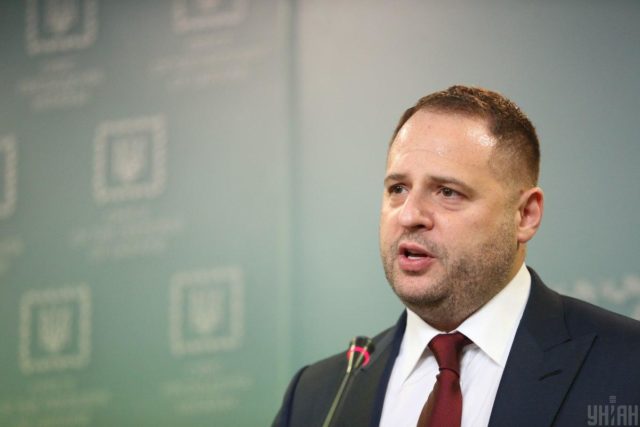
Zelenskyy Appoints Gerontocrats to Negotiate With Russia in Minsk (Part Two)
Publication: Eurasia Daily Monitor Volume: 17 Issue: 118
By:

*To read Part One, please click here.
Ukrainian President Volodymyr Zelenskyy and the head of his Presidential Office, Andriy Yermak, have chosen former president Leonid Kravchuk (86) to head the country’s delegation to the Minsk Contact Group as well as former prime minister Vitold Fokin (88) to join as a member of the negotiating team. Kravchuk replaces former Ukrainian president Leonid Kuchma (now 82), who recently resigned from the position, citing exhaustion. The de facto leader of the Ukrainian delegation, however, is reportedly Deputy Prime Minister Oleksiy Reznikov, who has spent the past several months adding increasingly numerous new layers of representatives to the negotiations from Kyiv’s side (see Part One).
Behind the Ukrainian delegation’s baroque layers and bursts of public activity, Yermak is actually running the negotiations from the Presidential Office. The appointment of figureheads like Kravchuk and Fokin can only facilitate Yermak’s control of the real process. Yermak alone enjoys the preemptive, almost exclusive access to Zelenskyy’s ear, a direct communication channel to his Kremlin counterpart Dmitry Kozak, and ultimate authority over the appointments that really matter. It is almost certainly due to Yermak’s influence that Zelenskyy’s instructions have marginalized Ukraine’s Ministry of Foreign Affairs from the Minsk Contact Group negotiations. Notwithstanding its high level of professionalism and trove of experience in the Minsk and Normandy processes since 2014, this ministry plays—according to Foreign Minister Dmytro Kuleba—merely a supporting role (Glavkom, July 31).
It was the Yermak-Kozak direct channel that resulted in Ukraine’s signing the Steinmeier Formula (see EDM, October 3, 2019) and the quasi-recognition of the Donetsk-Luhansk armed formations in the recent, enhanced ceasefire agreement (see EDM, July 29, 30, August 5, 6, 2020). Kravchuk’s predecessor as nominal delegation chief, Kuchma, had to sign on the dotted line in both cases. It remains to be seen how Kravchuk would respond in similar situations.
In that light, Yermak‘s latest claim that the Ukrainian side “has seized the initatiative in the negotiations” and even “dominates the negotiations” (Ukrinform, July 30) is misleading. Alluding as he does to the Reznikov-generated public brainstorms and the stream of new appointments to the Minsk delegation, Yermak is kicking up dust to conceal the actual direction of those negotiations: toward conflict-conservation on the Transnistria model.
According to Zelenskyy and Yermak, when announcing these appointments Ukrinform, July 30, 31; Liga.net, August 4; UKrinform, August 6), Kravchuk and Fokin are well known, credible and respected figures “on the other side” (euphemistic reference to the Russian-controlled territory) and can engage in a dialogue on that basis. But this belief, or claim, looks highly implausible. The last time Kravchuk’s standing was tested in that territory was in the 1994 presidential election, when Kravchuk lost the Donetsk and Luhansk provinces by a landslide (to Kuchma, who won the presidency as the candidate of Ukraine’s east). Kravchuk, a native of Ukraine’s west (Rivne province), has no known ties to Donetsk or Luhansk. For his part, Fokin (native to the Zaporizhzhia province) worked as a mining engineer in the Luhansk province from 1954 to 1971, after which he moved to Kiyv for good (see Part One). He headed a Luhansk fraternal association in the Ukrainian capital for a while, but the fraternity’s leadership changed several times since then, and the current fraternity leader (Vadym Goran) is one of Reznikov’s civil-society appointees to the Minsk Contact Group delegation.
Kravchuk has laid out his views and tentative proposals in a stream of media interviews (Ukraiynska Pravda, RBK Ukraiyna, July 30; Ukraiyna 24 TV, Suspilniy, July 31, August 1; Vesti, August 3; 112 Ukraiyna, August 4; Obozrevatel, August 8, 10; Radio Svoboda, August 10); and he has even given a video-interview to Olga Skabeyeva’s vituperative anti-Ukrainian show on Russia One TV (the studio audience predictably shouted Kravchuk down during the show).
Kravchuk’s proposals are all conditional on the ceasefire holding indefinitely. He would consent to a “special administrative status” for the now-occupied territory. This status would be a) clearly below the political-constitutional special status stipulated in the Minsk “agreements,” which would imply quasi-statehood, but b) well above the ordinary status of all of Ukraine’s provinces. Kravchuk fully shares Zelenskyy’s declared position that local elections in the now-occupied territory can only be held after the withdrawal of Russian forces, disbandment of local forces and restoration of Ukrainian sovereignty, including control of the Ukraine-Russia border. Kravchuk advocates for a free economic zone, backed by an international reconstruction fund, to be created in the Donetsk and Luhansk provinces. He does not yet clarify whether this zone would cover the now-occupied territory (presumably after its de-occupation) or the whole area of Ukraine’s pre-2014 Donetsk and Luhansk provinces; or whether it would be designed to benefit local business, Ukrainian tycoons, or international investors. Kravchuk offers to draw on his own experience in setting up “free economic zones” in the Donetsk, Luhansk and Dnipropetrovsk provinces during his presidency in 1991–1994. Those experiments were a complete failure, however (Ukrinform, August 5; Censor.net, August 8).
Fokin, for his part, proposes to open a direct dialogue with selected interlocutors in Donetsk and Luhansk in a first phase, and bring Kravchuk (as delegation chief) along into that dialogue in a follow-up phase. Those potential interlocutors remain unidentified for now (Gordon, August 3; Radio Svoboda, August 5).
All in all, the Kravchuk and Fokin appointments add to the image of dilettantism and improvisation in the Zelenskyy administration, even as the real negotiations proceed backstage in the Yermak-Kozak channel to Ukraine’s detriment.



